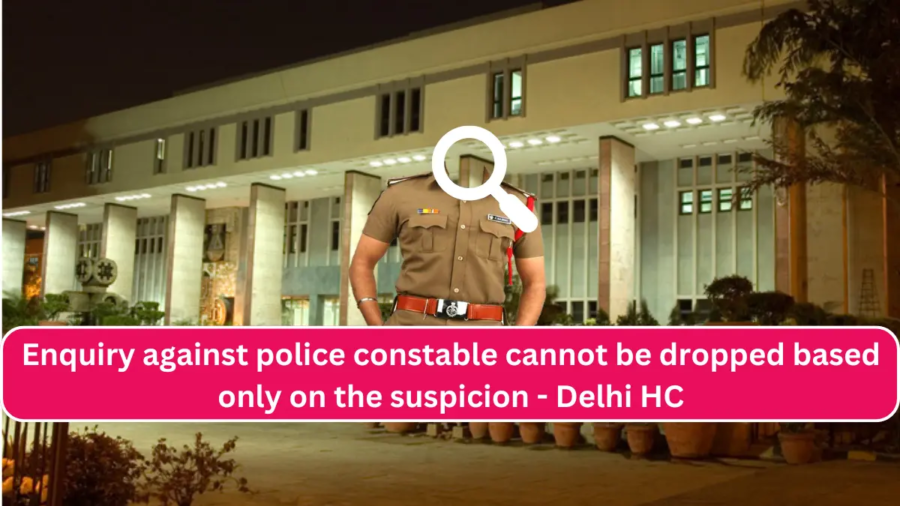Introduction
The Delhi High Court recently ruled on a case involving allegations of sexual harassment against a police constable under the Sexual Harassment of Women at Workplace (Prevention, Prohibition and Redressal) Act, 2013. The court’s decision highlights the importance of conducting a fair enquiry in such cases, despite concerns of potential witness intimidation.
Facts of the Case
The respondent started working as a constable for the Delhi Police on April 4, 2006. On July 22, 2017, a trainee female constable filed a complaint against the respondent, claiming that he had harassed her sexually, while she was assigned to the Police Training College in Jharoda Kalan, New Delhi. The Chairperson of the Internal Committee investigated this complaint and produced a preliminary report, which was turned in on 25th July 2017. As a result, on the same day, a FIR was submitted against the respondent in accordance with Sections 354(A), 294, and 509 of the IPC. He was then suspended on 26th July 2017, and soon after that he was relieved of his duties on August 1, 2017, in accordance with Article 311(2)(b) of the Indian Constitution. The respondent, dissatisfied with his termination, filed a statutory appeal, which was denied on November 3, 2017. After the respondent contacted the Tribunal, the Tribunal decided to reverse the August 1, 2017, dismissal order and the November 3, 2017, appellate order.
Argument by Petitioner
The Petitioners’ attorney claims that the Tribunal disregarded the extensive justifications in the dismissal order for choosing not to conduct a investigation into the Respondent’s behavior. A thorough investigation would have only increased the complainant’s fear given the serious allegations of sexual harassment against the Respondent and his reported intimidation of witnesses and the complainant during the preliminary inquiry.
Argument by Respondent
The Respondent’s attorney defended the contested order, claiming that the Tribunal properly overturned the dismissal order because the Petitioner did not present sufficient justification for evading a departmental investigation. The Respondent’s counsel disputed the Petitioners’ allegation that witnesses were coerced, stating that any accusation of witness intimidation ought to be rejected out of hand because the petitioners themselves accepted the statements made by witnesses during the preliminary inquiry.
Court’s Observation
The Delhi High Court noted that the Petitioners’ assumption that the Constable would intimidate witnesses was the reason behind their reluctance to conduct an inquiry. The order of dismissal revealed a preconceived belief about the Constable’s guilt without providing him with a fair trial.
The court scrutinized the earlier order passed in the case of Ct. Sumit Sharma v. Govt. of NCT, it had a significant impact on later decisions. In a previous ruling dated 10.02.2022, the Tribunal set precedent by stressing the value of following the law and maintaining procedural fairness, especially when it comes to employment disputes involving public sector employees.
The court examined the order dated August 1, 2017, which terminated the employment of the Respondent, then the Tribunal concluded that the petitioner’s justifications for circumventing the investigation did not adhere to Article 311(2)(b) of the Indian Constitution, notwithstanding grave accusations made against him. The Tribunal emphasized that there was insufficient proof to back up the petitioner’s allegation that the respondent had intimidated witnesses. In addition, it observed that there had been no sincere attempts to carry out an investigation, suggesting that the case had been handled mechanically.
In addition, a review of the dismissal order itself showed that the petitioners had taken a pre-determined position. They used allegations of witness intimidation and possible trauma to the complainant as justification for circumventing the inquiry process. The Tribunal, however, found these justifications inadequate and underlined the importance of respecting due process and natural justice principles even in situations involving grave accusations.
The court observed Ct. Sumit Sharma v. Govt. of NCT of Delhi and Ors, an established precedent for equitable treatment and adherence to procedure in labor disputes, especially in the public sector, guaranteeing that disciplinary actions are carried out in compliance with accepted legal norms and fairness principles.
Court’s Decision
The Constable’s dismissal order was set aside by the Court, and it upheld the CAT’s findings. It stressed how crucial it is to carry out an impartial investigation in line with the POSH Act’s requirements and principle of natural justice, even when it involves police officers. As such, the petition was dismissed by the High Court. The HC concluded that to ensure justice for all parties involved, it is imperative to uphold procedural fairness and due process, this is especially true in cases of sexual harassment that are delicate.
-By Anaida Khan Pursuing 4th year of BALLB (Hons.) from Dharmashashtra National Law University, Jabalpur
 Cart is empty
Cart is empty



